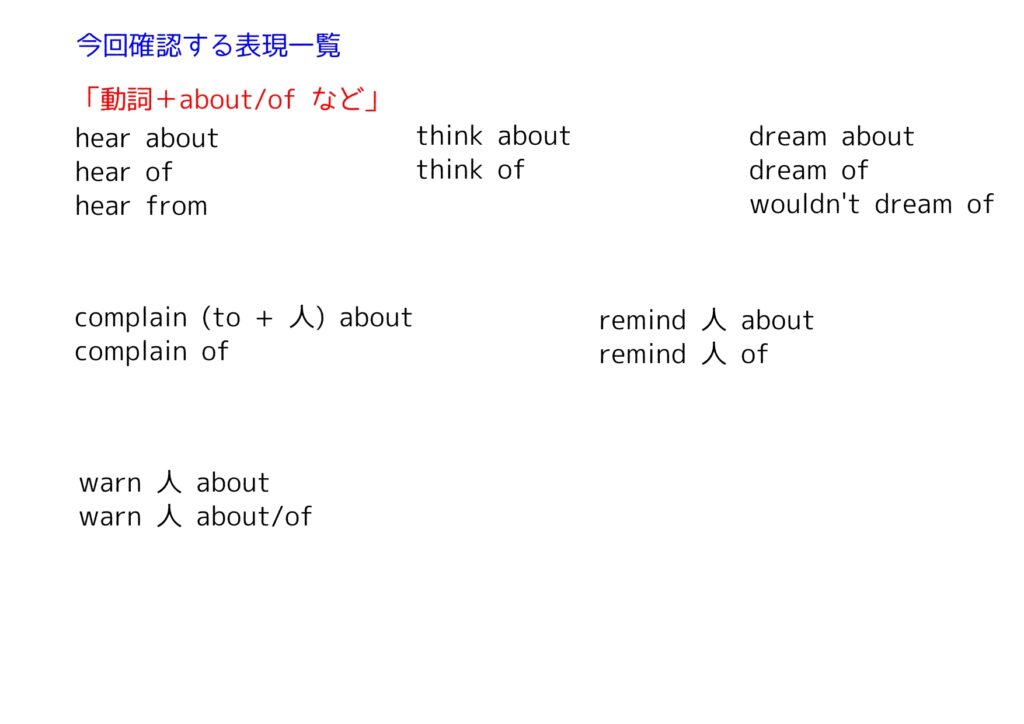第92回:about / with / for / of / on は動詞の後に続きやすい。

具体的に、どのような熟語があるのか。
前置詞が表している意味は何か。
これらのことを確認してみましょう。
Q. この記事で、一番大事なことって何?
A. 大事なことを、1枚の画像にまとめました。

いちいちノートにまとめるのが面倒だという方、また、
ノートにまとめることが苦手だという方は、ご活用ください。
※今回の記事では、以下の表現で使われているような前置詞の意味を確認します。

[広告]
確かな英語力は、日々の継続から。
その継続を後押しする、第二言語習得理論に基づいた
オンライン英語学習プログラムがあります。
英語を使う人のための、確実なスキルアップが望める
7日間の無料体験はこちらから!

【動詞の後の前置詞】
- about:
「about」は通常、「特定のことに関して」という意味で使用されます。
例:
They began to learn about nutrition when they were at primary school.(彼らは小学校にいる時に栄養について学び始めました。)
「care about」は、私たちが(関心を持っているか)心配していることについて話すために使用されます。
例:
He doesn’t seem to care about the effect a poor diet has on him.(彼は貧しい食事が彼に与える影響について心配していないようです。)
- for:
「ask for」は、「人々が何を望んでいるか」について話すために使用されます。
「argue for」は、何かが真実や正しいとされる理由を示すために使用されます。
「care for」は、誰かや何かを健康や状態が良い状態に保つために必要なことをする、または「好む」という意味で使用されます。
例:
He finished the drink quickly and asked for another.(彼は飲み物を早く飲み終え、もう一つを頼みました。)
例:
Many people are arguing for a big tax cut.(多くの人々が大幅な税金の削減を主張しています。)
例:
Jo cared for her disabled mother until her death last year.(ジョーは昨年、彼女の障害を持つ母親の世話をし続けました。)
I don’t care for the theatre much.(私は劇場はあまり好きではありません。)
Would you care for a cup of coffee?(コーヒーでもいかがですか?)
- of:
「of」は、「talk」「know」「learn」の後に使用され、話し合ったり情報を得たりすることを表します。
例:
Mira went recently to Laos and can talk of nothing else.(ミラは最近ラオスに行き、他のことを話すことができません。)
The whole country knew of Churchill’s love of cigars.(全国民はチャーチルの葉巻への愛を知っていました。)
I have just learnt of the death of Dr Ramirez.(私はちょうどラミレス博士の死を知りました。)
また、「ask of」は、頼みごとをするか話す際に使用されます。
例:
I have a favour to ask of you and your sister.(あなたとあなたの姉に頼みごとがあります。)
- on:
「on」は、「特定のトピックに関連して話す」という意味で使用されます。
例:
I was asked to talk on my research.(私は研究について話すように頼まれました。)
We agreed on a time to meet.(私たちは会う時間について合意しました。)
(通常、事前の議論や意見の相違がある場合に使用されます)
※「agree to」は、誰かが何かを許可することを意味します。
例:
Once the government agreed to the scheme it went ahead without delay.(政府がその計画に同意すると、遅延なく進行しました。)
- with:
「with」は、「argue」「talk」の後に使用され、関係する人物を言及するために使われます。
例:
I used to argue / talk with Pedro for hours.(私は以前、ペドロと何時間も論争/話しました。)
「agree with」は、2人が同じ意見を持っていることを表します。
例:
Adam thinks we should accept the offer, and I agree with him.(アダムは私たちがそのオファーを受け入れるべきだと考えています。私も彼に同意します。)
また、「approve of」という意味で特定のアイデアや行動を承認するためにも使用されます。
例:
I agree with letting children choose the clothes they wear.(子供たちが自分で服を選ぶことに賛成します。)
さらに、「2つの説明が同じである」という意味でも「agree with」が使われます。
例:
Stefan’s story agreed with that of his son.(ステファンの話は彼の息子の話と一致していました。)
これらの使い方についての注意点として、特定の人や物事を言及した後に「excepted」「apart」「aside」を使って、その人や物事が述べた内容に含まれていないことを示すことができます。
例:
It has been, 1984 excepted/apart/aside, the hottest July for the last 100 years.(1984年を除いて、過去100年で最も暑い7月でした。)
具体例
- about:
- She read a book about astronomy to learn more about the stars.
- We had a discussion about climate change during the conference.
- He cares about the environment and actively participates in recycling programs.
- for:
- She asked for a raise during the meeting with her boss.
- The protesters argued for stricter gun control laws.
- The veterinarian provides excellent care for animals at the clinic.
- of:
- They talked of their future plans during their romantic dinner.
- The whole town knew of his remarkable artistic talent.
- She just learned of the cancellation of the event through a news article.
- on:
- The expert was invited to give a talk on sustainable energy solutions.
- After much discussion, they finally agreed on a design for the new logo.
- The government agreed to implement the new policy once the benefits were explained to them.
- with:
- She often argues with her brother about politics.
- During the meeting, they talked with the CEO about the company’s future strategies.
- John agrees with his friend’s decision to start a business.
[広告]
TOEICのスコアを上げたいけれど、
まとまった勉強時間が取れなくて困っている…
なら、細かいスキマの時間を使いながら、
少しずつスキルを積み重ねてみてはどうでしょう。
スマホ1つでスコアアップが出来る、
オンライン講座のリンクはこちらから。

Q. この文法はどうやって使うのでしょうか?
A. 今回の文法を活用した会話文を見てみましょう。

Have you heard about the new environmental regulations?
(新しい環境規制について聞いたことある?)

Yes, I’ve been learning about them lately. It’s important to care about the impact we have on the planet.
(ええ、最近それについて勉強してるんだ。地球に与える影響を気にすることは大切だよね。)

Absolutely, I couldn’t agree more. We should all strive to be more conscious of our actions and how they affect the environment.
(まったくその通りだよ。私たちは自分たちの行動が環境にどんな影響を与えるか、もっと意識するべきだよ。)

I completely agree. It’s crucial that we take responsibility for our choices and make sustainable decisions.
(完全に同感だよ。選択肢に責任を持ち、持続可能な決定をすることが重要だよね。)
[広告]
ロゼッタストーン・ラーニングセンターで、最先端の教育制度を活用して英語を学びませんか?私たちは個々の学習ペースに合わせてeラーニングと対面教育を組み合わせ、柔軟な学習環境を提供しています。自宅でのeラーニングと対面教育のメリットを最大限に活かし、あなたの英語学習をサポートします。最新のテクノロジーと個別の指導が組み合わさった当センターで、自由な学習スタイルを体験してみませんか?英語学習を楽しく効果的に進めるための環境がここにあります。新たな一歩を踏み出して、新しい英語学習の旅に参加しましょう!

Q. この記事の要点は?
A. 動詞の後に続きやすい前置詞が表す意味を確認しました。
Prepositions after verbs:
- About:
- Used to mean ‘concerning a particular thing’.
- Combined with verbs like learn, talk, and care.
- Care about expresses concern or lack of concern.
- Ask for expresses a request or desire.
- Argue for presents reasons for something.
- Care for can mean ‘like’ or ‘want’ (formal usage).
- For:
- Used with ask to indicate what someone wants.
- Combined with verbs like argue and care for.
- Argue for means providing reasons.
- Care for means taking care of someone/something or indicating preferences (formal usage).
- Of:
- Used with verbs like talk, know, learn, and ask.
- Talk of/about means discussing or having information.
- Know of/about means being aware or having knowledge.
- Learn of/about means acquiring knowledge or being informed.
- Ask of means making or talking about requests.
- On:
- Used with talk and agree.
- Talk on/about means discussing or focusing on a particular topic.
- Agree on means reaching a mutual decision or arrangement.
- Agree to means giving permission or allowing something to happen.
- With:
- Used with argue and talk when mentioning the person involved.
- Argue/talk with means engaging in a conversation or discussion with someone.
- Agree with means having the same opinion as someone.
- Agree with can also mean approving of an idea or action.
- Agree with can indicate two descriptions being the same.
Note: Different prepositions can be used after verbs to convey specific meanings and relationships.
英会話を始めてみたいけれど、どのサービスが良いか分からない…
そんな方は、まず、この記事で3つのサービスを比べてみてはいかがでしょうか?
英語力を効率良く伸ばすことができるサービス3選です。

次回の文法解説は?
名詞の後に続く前置詞。
この記事を作る際に参考にした文法の解説書になります。
すべて英語で書かれていますが、練習問題が付いてます。
イギリス英語なので、スペル等の表記が異なる部分もありますが、
「使い方を練習したい」「繰り返し問題を解きたい」
という方は、使ってみても良いかもしれません。

関連記事一覧
[広告]
日本人の講師と学んで、英語を使う不安を減らし、
ネイティブの講師とのレッスンで、学んだことを活用する
そんな、体系的な英会話のレッスンを提供している、
オンライン英会話スクールのリンクはこちら。

他の文法解説記事を検索できます。



-320x180.jpg)



-320x180.jpg)
-320x180.jpg)
-320x180.jpg)




コメント